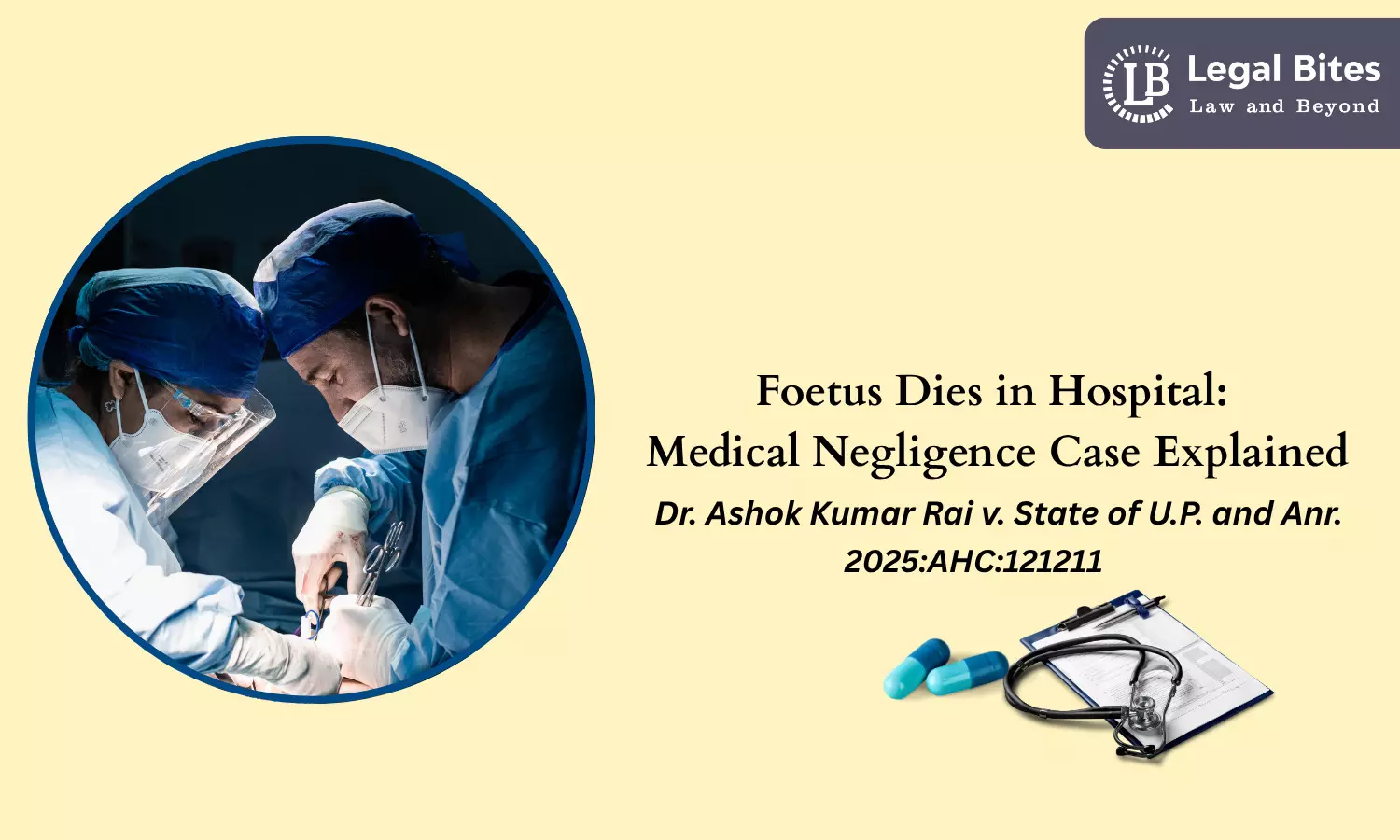Is a Doctor Liable When a Foetus Dies Due to Prolonged Labour in His Hospital?
This article examines medical negligence, doctor accountability, and expected care standards during childbirth in India.

The intersection of medical negligence and criminal liability is a contentious and delicate area of law. Particularly when it concerns the loss of life, courts are often called upon to evaluate the extent of professional negligence. One such case is Dr. Ashok Kumar Rai v. State of U.P. and Anr. (2025), where the Allahabad High Court addressed the question: Is a doctor criminally liable when a foetus dies due to prolonged labour at his hospital?
This article explores the legal issues raised, the evidentiary standard in medical negligence cases, and the balance courts strike between protecting doctors and ensuring accountability.
Factual Background
On July 28, 2007, a pregnant woman named Usha Pandey was admitted to Savitri Nursing Home in Deoria, owned by Dr. Ashok Kumar Rai. She was due for a caesarean section. The patient’s family alleged that although consent for the surgery was given around 11:00 AM on July 29, 2007, the surgery was delayed till 5:30 PM, by which time the foetus had died due to “prolonged labour.”
They also alleged that hospital staff behaved abusively when questioned and refused to provide a discharge slip until pressured by legal authorities.
Dr. Rai claimed that the delay was due to the family’s insistence on normal delivery and that the surgery was performed as soon as they consented.
The Legal Proceedings
An FIR was lodged under Sections 304A (causing death by negligence), 315 (act done with intent to prevent child being born alive), 323 (voluntarily causing hurt), and 506 (criminal intimidation) of the Indian Penal Code.
While a Medical Board constituted by the Chief Medical Officer initially cleared Dr. Rai of negligence, the protest petition filed by the complainant highlighted critical contradictions and missing evidence—especially the post-mortem report indicating the cause of death as “prolonged labour.”
Eventually, the trial court summoned Dr. Rai. He challenged the order under Section 482 CrPC seeking quashing of proceedings, which was dismissed by the Allahabad High Court on 24 July 2025.
Key Legal Issues
1. What Constitutes Medical Negligence?
Negligence, in simple terms, is the breach of a duty of care resulting in harm. In the medical context, this includes:
- Delay in treatment
- Misdiagnosis
- Failure to act as per standard medical practice
In Bolam v. Friern Hospital Management Committee (1957), a landmark English case adopted by Indian courts, it was held that a medical professional is not negligent if his actions are in line with a responsible body of medical opinion.
2. Criminal v. Civil Negligence
The court in Jacob Mathew v. State of Punjab (2005) 6 SCC 1, drew a crucial distinction between civil and criminal liability. For criminal negligence under Section 304A IPC:
- The negligence must be gross or reckless.
- A mere error in judgment does not suffice.
Application in the Present Case
The Allahabad High Court noted that:
- Consent for surgery was taken at 12:00 PM.
- Surgery was conducted at 5:30 PM.
- The post-mortem clearly mentioned "prolonged labour" as the cause of death.
- There was an unexplained delay of over five hours.
- Two contradictory OT notes were discovered.
- The Medical Board did not consider the post-mortem report or take statements from the patient's side.
All these factors led the Court to hold that a prima facie case of medical negligence existed.
Evidentiary Standards and Contradictions
Contradictions in Statements
- Dr. Rai made inconsistent statements about the patient’s admission time—10:30 AM, 3:30 PM, and 7:00 PM—at different stages.
- These inconsistencies cast doubt on the hospital’s conduct and supported the complainant’s case.
Missing Records
- The post-mortem report stating death due to prolonged labour was not placed before the Medical Board.
- Two OT notes with differing details further undermined the hospital’s credibility.
Consumer Court v. Criminal Court: Can Both Proceed?
Dr. Rai argued that since the family had already filed a complaint before the Consumer Forum in 2009 (still pending as of 2025), criminal proceedings should not continue.
However, the Court, relying on V. Kishan Rao v. Nikhil Super Speciality Hospital (2010), clarified that consumer redressal and criminal prosecution can run simultaneously if both civil wrong and criminal negligence are involved.
Doctor’s Defence and Precedents Cited
Dr. Rai’s counsel relied on:
- Jacob Mathew v. State of Punjab (2005): Gross negligence required for criminal prosecution.
- Dr. Suresh Gupta v. Govt. of NCT of Delhi (2004): Mere inadvertence or judgmental errors should not attract criminal liability.
- Kusum Sharma v. Batra Hospital (2010): Set out eleven principles to test medical negligence.
However, the High Court noted that these principles apply after evaluating all evidence. In the present case, the gaps in evidence collection and procedural delay necessitated a full trial.
Judicial Observations: Protecting v. Prosecuting Doctors
The Court emphasized that while protecting doctors from frivolous or unfounded cases is important, it is equally essential to hold them accountable when they fail to provide standard care. It clarified that medical practitioners deserve protection only when they act with due diligence, not when they operate nursing homes lacking proper facilities or infrastructure.
The Court warned against the growing tendency of private hospitals to attract patients without infrastructure or specialist support, treating them as “ATM machines.”
Final Verdict
The Allahabad High Court held that:
- There is a prima facie case of medical negligence.
- The summoning order was not illegal.
- The contradictions in timing, lack of immediate action post-consent, and the post-mortem report are matters for trial.
- The application under Section 482 CrPC was devoid of merit and was dismissed.
Key Highlights of the Decision
The Bench, led by Justice Prashant Kumar, remarked:
"It is common practice these days that private nursing homes/hospitals tend to entice the patients for treatment even though they do not have the doctors or infrastructure. When the patient is admitted in a private hospital they start calling for the doctor to treat the patient....
No doubt, yes the medical practitioner had to be saved from the clutches of medical negligence otherwise that would cause trembling and dangling fear among doctors of commencing criminal prosecution of any failure in any operation/surgery. This is the fact that any medical professional, who carries out his profession with due diligence and caution, has to be protected but certainly not those doctors who have opened nursing home without proper facilities, doctors and infrastructure and enticing the patients just to extract money out of them."
Implications of the Judgment
This judgment reinforces that:
- Doctors are not above the law – especially when basic procedural standards are not followed.
- Medical records must be accurate and transparent – conflicting documents will be viewed with suspicion.
- Private hospitals must ensure operational readiness – the absence of an anaesthetist delaying critical surgery could be criminally negligent.
- Medical Boards must examine all evidence – including post-mortem reports and complainant versions, not just the doctor’s defense.
Conclusion
The question—Is a doctor liable when a foetus dies due to prolonged labour in his hospital?—does not have a blanket answer. However, the Allahabad High Court’s ruling in Dr. Ashok Kumar Rai v. State of U.P. affirms that doctors may be held criminally liable when delay or omission in performing timely medical procedures results in preventable loss of life.
While courts must protect the integrity of the medical profession, they must also ensure that negligence under the cloak of professional discretion does not go unpunished.

